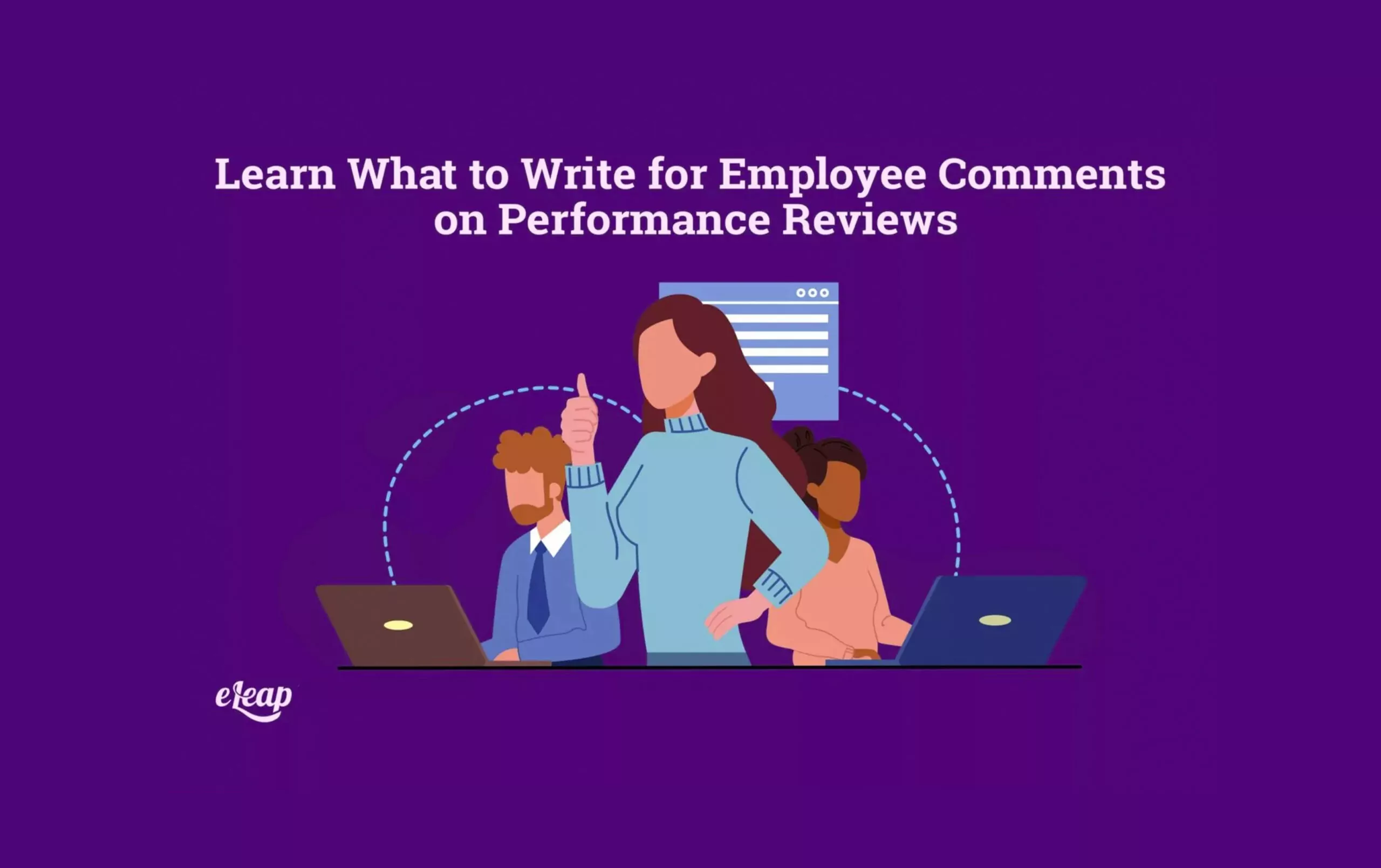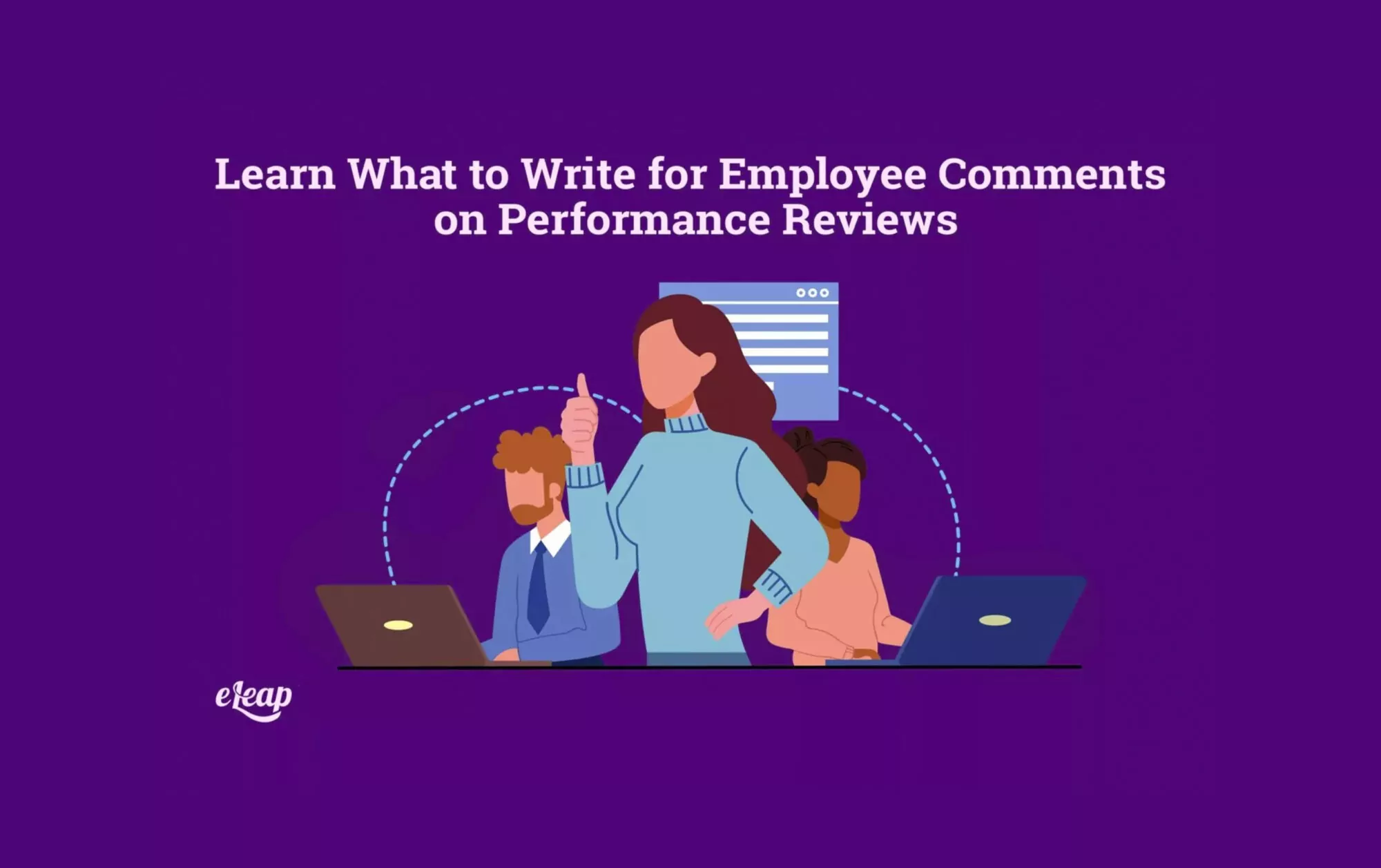Learn What to Write for Employee Comments on Performance Reviews

Figuring out what to write for employee comments on performance reviews isn’t always easy. You want your words to be accurate, effective, and to come across with the appropriate tone. Your employees should be able to take your comments and turn them into actionable steps that they feel confident working toward.
Performance reviews began as a way to weed out bias in the workplace and ensure that everyone was treated equitably. They are also a way to encourage and motivate team members who deserve recognition and/or need scaffolded guidance to improve. You can ensure that this happens by learning what to write for employee performance review comments.

Here are some concrete steps that you can implement in your evaluation writing.
Give a Full Picture
Performance reviews should be comprehensive. You want to discuss an employee’s performance in the timespan for the review as well as how it measured up to the goals set at the last meeting. You should discuss not only strengths and achievements, but areas for improvement. The growth opportunities should come with helpful plans and guidance. Remember, too, that you should be giving feedback in regular interactions with your employees outside of these meetings, so you aren’t giving them brand-new information that might surprise them.
If you find it difficult to remember more than just the past few months, and your review meetings take place annually, you could keep a running document with small notes about each team member’s projects, feedback from peers, and observations. Then you won’t feel as if you’re starting from scratch for each employee’s comments on their performance review.
Positivity Is Key
Performance reviews aren’t always filled with good things to say, but that doesn’t mean that you have to deliver difficult feedback with a negative tone. Learning to give constructive criticism in a way that inspires people to improve is an important skill. People respond much better when they feel supported and guided.
If you have to write comments that might be hard to hear, try sandwiching the feedback with something positive on either side. For example, “Chris always asks questions to clarify direction on projects. He struggles to remember company policy regarding XYZ and that requires many adjustments; however, he is quick to fix mistakes.” Then, detail a plan for helping the employee improve.
Use Specific Examples
Vague language is not your friend. If you say something like, “Jesse is a team player,” that doesn’t give the employee something actionable that they want to keep doing. Instead, pull examples from their work and connect them to the traits you want to recognize. For example, “Jesse is efficient under pressure. On the XYZ account, their partner was reassigned, and Jesse had to take on more responsibility to close the account by the deadline. He still completed it ahead of schedule without sacrificing quality.”
Your employees want to know that they are seen and recognized. Even if they don’t want you hovering over their shoulder day in and day out or micromanaging projects, they need to understand that you are present and that you notice their efforts.
Being specific and using examples also prevents misunderstanding. If you generalize, it leaves room for interpretation and might also feel like you aren’t giving a thoughtful review. It’s okay to use non-concrete examples in everyday interactions, such as, “Great job on that!” or “You communicated that nicely,” but when you’re delivering a performance review your employee comments should be much more direct.
Use Development Suggestions to Facilitate Growth
One of the most frustrating things an employee can experience is being asked to improve without being told how they can do so or what they need to change. When you think about it, if they knew what they were doing wrong and how to fix it, they would have done so already. So, instead of simply discussing a problem, pair it with a solution.
Your job as the manager is to offer leadership and guidance to develop your employees into the valued team members you need. However, this doesn’t mean that you need to take on the entire job of figuring out how to fix an issue. Offer the opportunity for your employee to come up with a resolution that they think would help. For example, if your team member is chronically late to work, ask them what it is that keeps them from getting there on time each day. Traffic? Long lines dropping their children off at school? Forgetting work-related items at home and needing to go back? Whatever it is, fleshing out the problem out loud and owning the solution makes it more likely that they put forth the effort toward improving.
This is an opportunity to build people up and create a culture of teamwork and positivity. If employees are shamed or demoralized, they aren’t going to be motivated to grow.
Choose Your Vocabulary Wisely
Employee comments on performance reviews are much more effective when they are filled with actionable steps and concrete examples of what people should keep doing, stop doing, and start doing. It’s difficult for someone to hear, “Your work is slipping; you need to bring it back up to a higher standard.” Okay, but in what way? Instead, choose verbs that give direct instruction. “Your work over the last three months has had numerous errors and a lack of unique ideas. Carefully edit your projects before turning them in and expand your range of topics.”
You don’t have to recreate the wheel for each employee or each review meeting, either. It’s okay to have some standard phrases that you alter with individual information. Just make sure that once you’ve tailored them to the particular employee for the current period, they accurately reflect each person’s performance and the tone you want to convey.
It’s also important to avoid absolutes. Rarely, if ever, are ‘always’ and ‘never’ actually true. If you tell someone that they always interrupt others during staff meetings, they might become defensive. Instead, you could say, “Many times when someone is sharing an opinion in a staff meeting, you interrupt them before they can finish their thought. It becomes distracting and people can’t communicate effectively. People have to begin their thoughts over again to redirect the conversation and it wastes time.”
If you use absolutist language, it demeans the credibility of everything else you’re saying on your performance review and your employees will be likely to shut out any constructive feedback. Use specific words and concrete examples so that employees know you aren’t simply fluffing the review or rushing through the evaluation and expecting them to change without guidance.
It’s also important to note that you should never mention sensitive information such as an employee’s age, gender, sexual orientation, race or ethnicity, or religion.
Structure Your Evaluation
Your employees should be able to follow along with what you’re discussing without wondering what is coming next or if something is going to be brought up again. If your company doesn’t have a particular structure for its performance reviews, make one yourself.
You could discuss strengths first, as it makes a performance review go more smoothly if you can start on a positive note. Then you can speak about opportunities, which are unexplored strengths. You might bring up skills that you have observed that the employee might not have recognized in themselves or that they tend to brush off. Talk about goals that were met and what you noticed that you would like to continue.
Then, note areas of improvement and plans of action for growth. Keep a positive tone and offer plenty of actionable guidance so that the employee isn’t frustrated or left to flounder. If you notice patterns of behavior that are impeding either the employee’s success or the company’s, make sure that you check in with the team member often to confirm they are on track toward making improvements.
You Can Learn What to Write for Employee Comments on Performance Reviews
This is a skill that will take time to develop as a manager. If you aren’t sure that you’re delivering effective performance reviews, ask some of your more long-time employees to give you a review of your evaluations. What was the tone you wanted to convey and did it come across well? Do they know what you need to be done and the successes that you recognized?
Once you’ve learned what to write for employee comments on performance reviews and you’ve had some practice delivering them, your employees and business will benefit exponentially. This is a time-consuming task for managers, but it should be done thoughtfully. Your employees deserve constructive feedback and your company needs team members who are held to high expectations.
Managers who use precise language, offer concrete guidance, and help provide solutions while placing ownership in the hands of the employee are strong, effective leaders. People want to work hard for someone who shows that they care about their team.